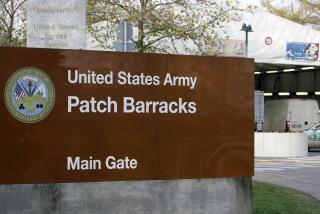Turmoil in Muslim world, summer travel peak behind U.S. terror alert
As Americans pack their bags and hoist their backpacks for an end-of-summer foreign adventure, a U.S. government travel alert is urging them to be vigilant amid indications that Islamic militants are plotting terrorist strikes.
The State Departmentâs worldwide travel alert Friday, warning Americans to be alert to possible attack plans by Al Qaeda and its allies, comes at the peak of the vacation season, when hundreds of thousands are boarding planes, trains and cruise ships that are terroristsâ prime targets.
Intelligence-gatherers have picked up increasing âchatterâ among suspected militants about attacks timed to the end of the Ramadan holy month observances and specific actions reportedly planned by the Al Qaeda in the Arabian Peninsula group that counterterrorism officials consider the biggest threat to U.S. and Western citizens and interests.
âThere are concerns about a major Al Qaeda in the Arabian Peninsula plot that goes up to Nasir al-Wahishi, who has been the emir of AQAP since the organization was created,â said Seth Jones, a terrorism analyst with Rand Corp. and former advisor to U.S. Special Operations Forces.
Intelligence monitors have also recently intercepted indications of plots targeting U.S. diplomatic or business facilities in Somalia, Pakistan, Afghanistan and Tunisia, Jones said.
The State Department warning was intended to encourage vigilance among traveling Americans and U.S. officials responsible for foreign diplomatsâ security, Jones said. But it also serves to give would-be attackers pause to consider whether their plans have been compromised, which can result in the operation being delayed or abandoned, he said.
Out of âan abundance of caution,â the State Department said, it was warning U.S. citizens to be particularly alert in places where tourists gather and on the conveyances that bring them there.
âU.S. citizens are reminded of the potential for terrorists to attack public transportation systems and other tourist infrastructure,â the government warning reads. âTerrorists have targeted and attacked subway and rail systems, as well as aviation and maritime services.â
The warning that extends through the month of August didnât specify any particular locale or event that prompted the unusually broad alert. In a related action, the U.S. government ordered its embassies and consulates in 17 countries in the Middle East and Northern Africa to close on Sunday, the start of the work week in the Muslim world that emerges from the holy month of Ramadan on Wednesday.
âCurrent information suggests that Al Qaeda and affiliated organizations continue to plan terrorist attacks both in the region and beyond, and that they may focus efforts to conduct attacks in the period between now and the end of August,â the State Department warning said.
Sunday is inauguration day for Iranâs next president, Shiite cleric Hassan Rouhani. Although the soft-spoken Iranian leader elected in June is far less bellicose than the strident Mahmoud Ahmadinejad, whom he will replace, Al Qaeda operatives are mostly Sunni Muslims and often target the rival sect that holds power in Iran, Syria and Iraq.
With Ramadan observed in the height of summer this year, the daylight fasting ritual has deprived the faithful of food and water for more hours than when the holy month occurs in winter. That traditionally constrains major militant operations.
The âchatterâ among militants picked up by U.S. and allied intelligence seemed to point to a suspected threat in the Muslim world, rather than a Western site popular with travelers. The embassies ordered closed out of concern for State Department employeesâ safety are all in areas where sectarian violence has flared recently or tensions are rising between secular and religious communities.
The U.S. missions that will be closed for at least one day and possibly longer are in Bahrain, Egypt, Iraq, Israel, Jordan, Kuwait, Libya, Oman, Qatar, Saudi Arabia, United Arab Emirates, Yemen, Afghanistan, Bangladesh, Mauritania, Sudan and Djibouti.
The State Department referred travelers to its website for travel safety tips and the Smart Traveler Enrollment Program that puts those abroad on the nearest embassy or consulate radar in case of the need to convey specific threats detected in their area.
The alert may have been prompted by concern over the sheer volume of Americans traveling abroad in August, providing convenient âsoft targetsâ at popular tourist sites and on public transportation. But with the exceptions of Egypt and Israel, the countries where U.S. diplomatic missions will be closed are not major tourism destinations.
U.S. officials may be moving more proactively in response to the latest intelligence because of âlessons learnedâ during last yearâs anniversary of the Sept. 11, 2001, terrorist attacks in the United States. An armed assault on the U.S. mission in Benghazi, Libya, on the 9/11 anniversary last year killed U.S. Ambassador J. Christopher Stevens and three other Americans.
The State Departmentâs failure to order protective measures upon receipt of intelligence reports warning of a possible terror attack have subjected the Obama administration to withering criticism from Congress and political rivals.
ALSO:
Syria opens new front in social media war: Instagram
Arab Israelis protest against plan to evacuate Bedouins
African observers criticize Zimbabweâs election, wonât reject results
Twitter: @cjwilliamslat
More to Read
Sign up for Essential California
The most important California stories and recommendations in your inbox every morning.
You may occasionally receive promotional content from the Los Angeles Times.











